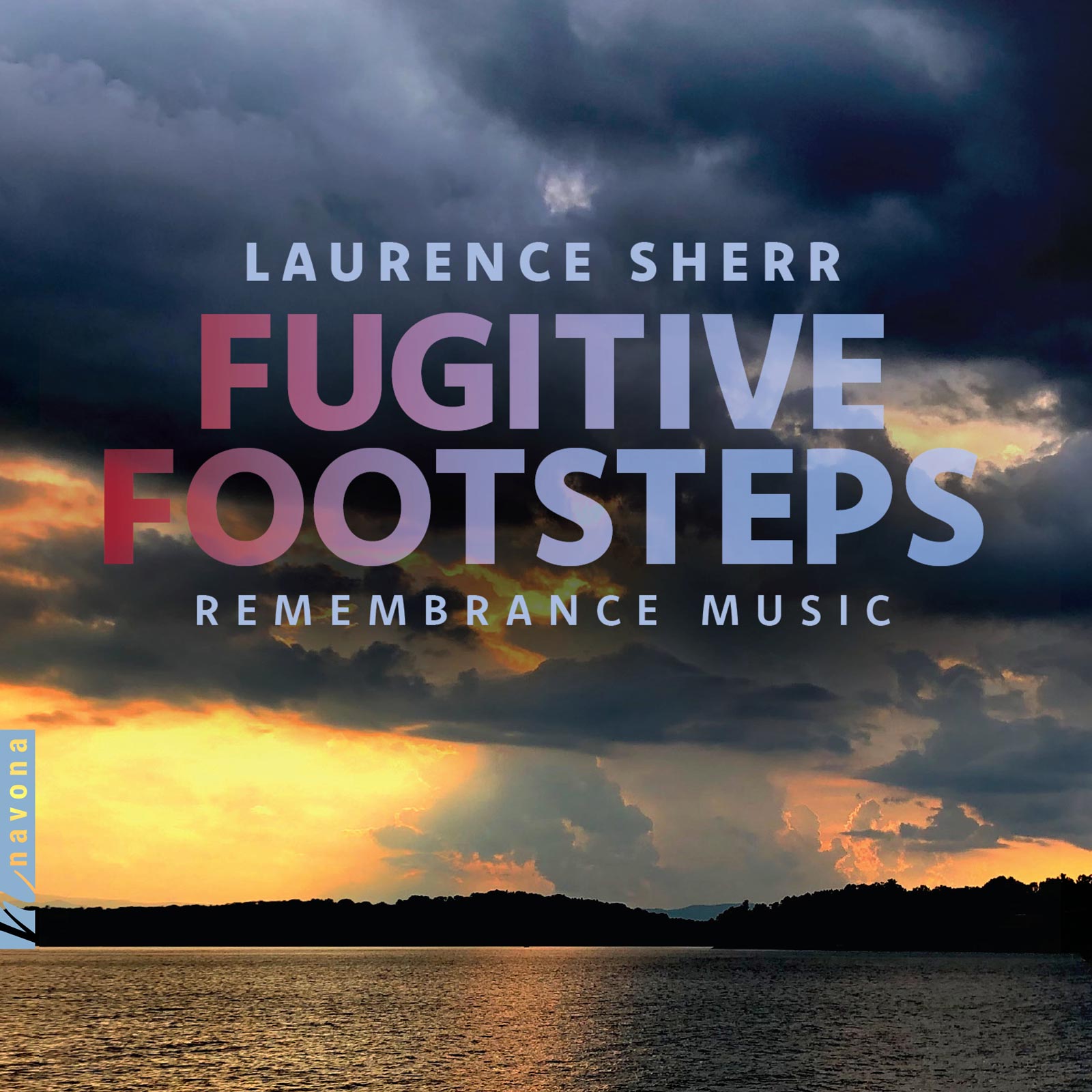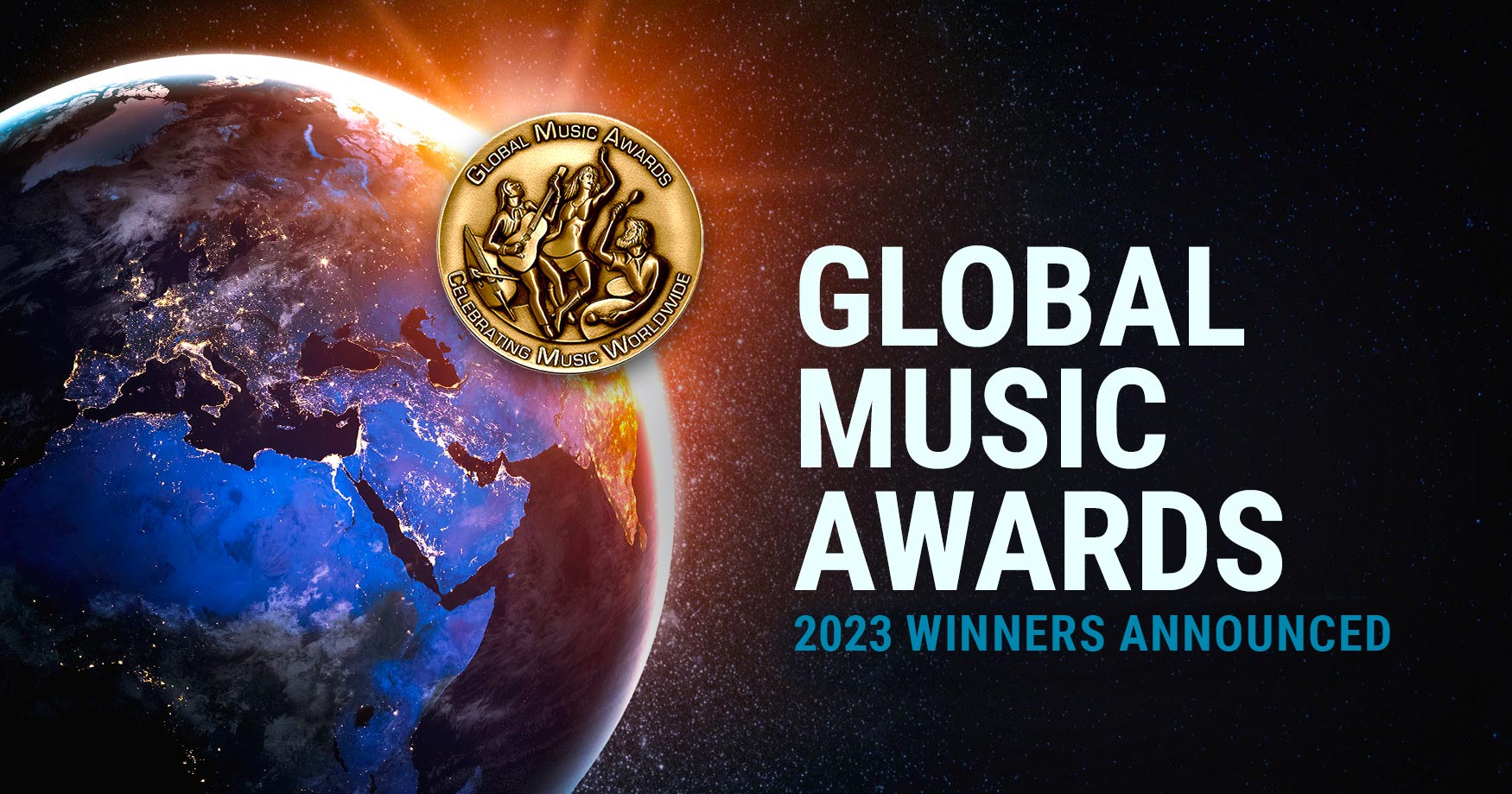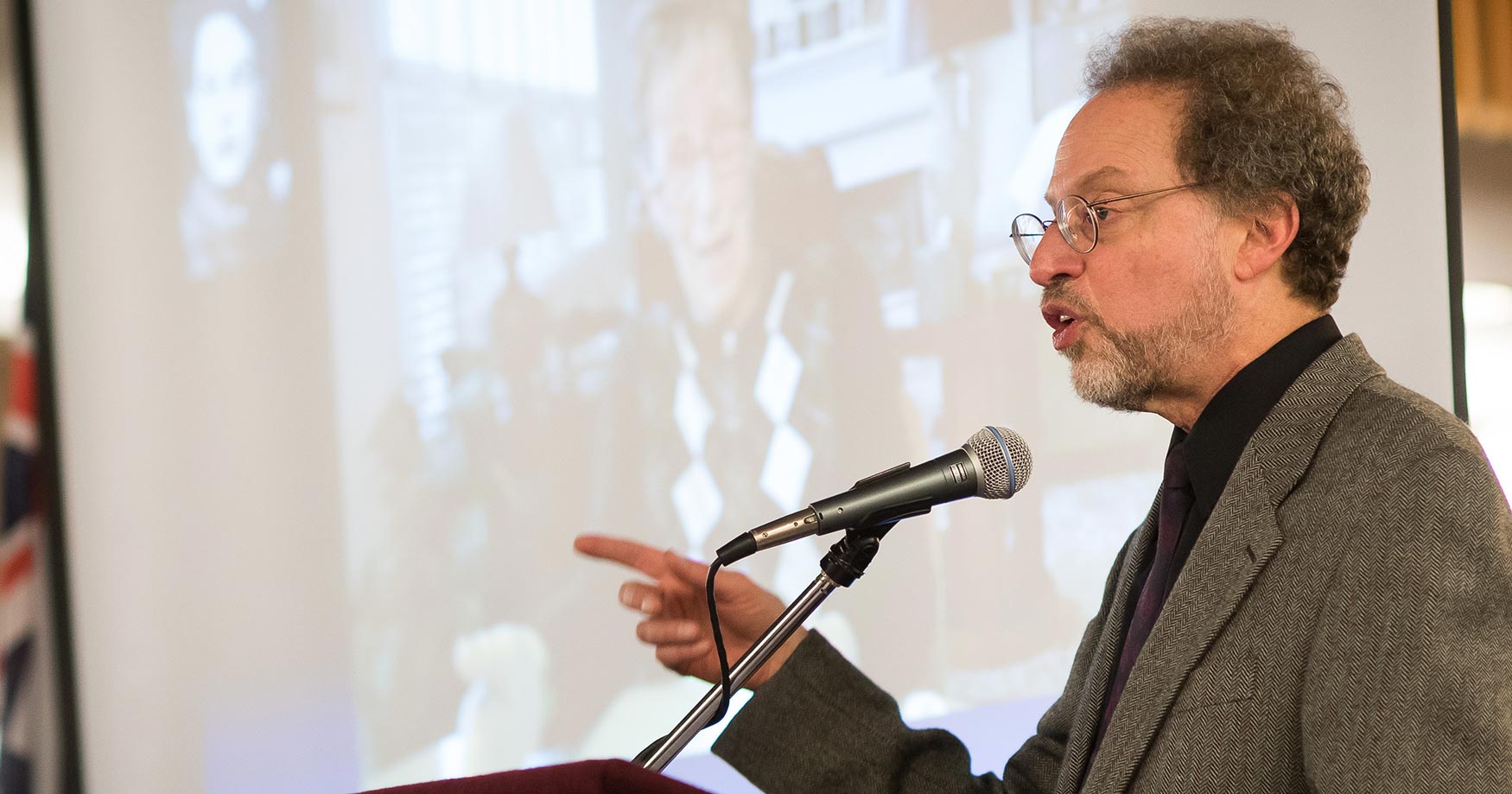Fugitive Footsteps
Laurence Sherr composer
Laurence Sherr delves deep into the spirit of resilience with FUGITIVE FOOTSTEPS: REMEMBRANCE MUSIC. Not shying away from musically pointing to suffering and despair, Sherr paints a vivid picture of persecution, trauma, and survivor’s guilt but also of silent and active opposition, hope, renewal, and the eventual overcoming of adversity. Through remembrance and tribute, these compositions unapologetically aim to tell stories of Holocaust resistance and survival, not only in concept but also in their individual tonal language: at all times fully conscious of their cultural roots, vast heritage, a sacrosanct sense of belonging, and the duty of defending these treasures. But perhaps, even more, these works reveal pathways to clearer, brighter horizons.
Listen
Stream/Buy
Choose your platform
"Somber and moving."
"Profound beauty."
Track Listing & Credits
| # | Title | Composer | Performer | |
|---|---|---|---|---|
| 01 | Sonata for Cello and Piano–Mir zaynen do!: I. Resolute | Laurence Sherr | Inbal Megiddo, cello; Jian Liu, piano | 7:09 |
| 02 | Sonata for Cello and Piano–Mir zaynen do!: II. From another realm | Laurence Sherr | Inbal Megiddo, cello; Jian Liu, piano | 9:21 |
| 03 | Sonata for Cello and Piano–Mir zaynen do!: III. Partisan march | Laurence Sherr | Inbal Megiddo, cello; Jian Liu, piano | 9:10 |
| 04 | Khayele’s Waltz | Laurence Sherr | Deborah Rawson, clarinet; Inbal Megiddo, cello | 3:26 |
| 05 | Fugitive Footsteps | Laurence Sherr | Cory Schantz, baritone; Kennesaw State University Chamber Singers | Samuel Miller, conductor | 14:31 |
| 06 | Khayele’s Waltz | Laurence Sherr | Friedrich Edelmann, bassoon; Rebecca Rust, cello | 3:43 |
| 07 | Flame Language | Laurence Sherr | Heather Witt, mezzo-soprano; John Warren, clarinet; Charae Krueger, cello; Robert Henry, piano; John Lawless, percussion; David Kehler, conductor; | 11:10 |
| 08 | Elegy and Vision | Laurence Sherr | Inbal Megiddo, cello | 8:51 |
Sonata for Cello and Piano–Mir zaynen do!, Khayele’s Waltz, Elegy and Vision
Recorded July 28–29 & 31, 2019 at Adam Concert Room in Wellington, New Zealand
Producer Donald Maurice
Engineer Graham Kennedy
Fugitive Footsteps
Recorded November 12–13, 2021 at Morgan Hall in Kennesaw GA
Artistic Advisor Leslie Blackwell
Engineers Matthew Southern, Collin Derrick
Khayele’s Waltz
Recorded live on November 2, 2020 at Synagoge Altenkunstadt in Altenkunstadt, Germany
Engineer Joerg Marxen
Flame Language
Recorded January 29–30, 2021 at Morgan Hall in Kennesaw GA
Engineers Joseph Greenway, Mark Fucito
Editing & Mixing Mark Fucito
Mastering Melanie Montgomery
Cover photo by Laurence Sherr
Executive Producer Bob Lord
A&R Director Brandon MacNeil
A&R Chris Robinson
VP of Production Jan Košulič
Audio Director Lucas Paquette
VP, Design & Marketing Brett Picknell
Art Director Ryan Harrison
Design Edward A. Fleming, Morgan Hauber
Publicity Patrick Niland
Artist Information

Laurence Sherr
Laurence Sherr is recognized for his uniquely interconnected work on music related to the Holocaust, uniting his activities as composer of remembrance music, researcher, lecturer, producer of remembrance events, author, and educator. He has presented this work in the Czech Republic, Germany, Poland, England, Norway, San Marino, Israel, Australia, New Zealand, Brazil, and across the United States. Containing “sacred beauty and abundant lyricism,” and “moments that convey energy, lyricism, drama, and bravado” (EarRelevant), Sherr’s album – FUGITIVE FOOTSTEPS: REMEMBRANCE MUSIC – was awarded a Gold Medal in the Global Music Awards. He designs events that feature remembrance music enriched by stories of Holocaust-era creators and concurrent musical and historical developments.

Inbal Megiddo
Cellist Inbal Megiddo has performed as soloist in many of the major concert halls around the world, including recitals at the Kennedy Center, Carnegie Hall, and the Staatsoper Berlin, with concerto performances at the Berlin Philharmonie with the Berlin Symphony. Maestro Zubin Mehta describes her as “an extremely talented, very musical musician.” At her New York debut at the Lincoln Center her playing was hailed by the press as having “magical expression and technical expertise.” She has a “warm lustrous communicative way… the performance was sincerity personified!”

Jian Liu
An internationally celebrated concert pianist, Dr. Jian Liu has performed throughout Europe, Asia, and North America. His artistry has taken him to some of the world’s most prestigious concert halls, including Carnegie Hall, Lincoln Center, and Steinway Hall in New York, Sprague Hall, and Woolsey Hall of Yale University, and Paul Hall of Juilliard School, and as a featured soloist with orchestras including Symphony Orchestra of National Philharmonic Society of Ukraine, China National Symphony Orchestra, New Zealand Symphony Orchestra, Auckland Philharmonia Orchestra, Christchurch Symphony Orchestra, and Yale Philharmonia, among others. He has also recorded many CDs, one of which, Debussy Sonatas and Piano Trio, has been nominated as Best Classical Artist in the New Zealand Music Awards.

Deborah Rawson
Formerly Head of Woodwinds at the New Zealand School of Music, Victoria University, Deborah Rawson studied clarinet at Canterbury University and the Guildhall School of Music and Drama, London. She returned to New Zealand and became known as a soloist, chamber and orchestral player, university tutor, and founding member and leader of several ensembles – The Zelanian Ensemble, Saxcess, The Kugels, and others.

Cory Schantz
Cory Schantz has been described as possessing a voice of uncommon beauty and having a captivating stage manner that moves audiences with honest characterizations, whether comedic, dramatic, or heartfelt. His performances have been called “handsomely sung” and he has been recognized by the Baltimore Sun as an “engaging presence on stage.”

Samuel Miller
Samuel Miller currently serves as Assistant Director of Choral Activities in the Dr. Bobbie Bailey School of Music at Kennesaw State University; he conducts the KSU Chamber Singers, Chorale, and Men’s Ensemble and teaches courses in choral conducting and music theory. At KSU, he was honored to conduct the Chamber Singers in a performance of John Rutter’s Requiem for a 20-year commemoration of the September 11 attacks.
Kennesaw State University Chamber Singers
The Kennesaw State University Chamber Singers is the premiere auditioned choral ensemble at the university and is comprised exclusively of undergraduate students, primarily music majors. The KSU Chamber Singers have performed at national, regional, and state conferences of the National Collegiate Choral Organization (NCCO), American Choral Directors Association (ACDA), and Georgia Music Educators Association (GMEA). In 2010, the choir sang at the ACDA Southern Division Conference, presenting music of South America. In 2013, the KSU Chamber Singers were selected to perform at the NCCO’s 5th National Conference, performing David Maslanka’s masterwork A Litany for Courage and the Seasons. They performed for the fifth time by invitation at the GMEA state conference in 2018 and were honored to be selected to perform at the 2020 ACDA Southern Division Conference.

Friedrich Edelmann and Rebecca Rust
The American cellist Rebecca Rust, former student of Margaret Rowell, Bernard Greenhouse, and Mstislav Rostropovich, and German bassoonist Friedrich Edelmann, former principal bassoonist of the Munich Philharmonic Orchestra under the principal conductors Sergiu Celibidache and James Levine as well as under guest conductors Karl Böhm, Georg Solti, Carlos Kleiber, Carlo Maria Giulini, Zubin Mehta, Kurt Masur, Erich Leinsdorf, Eugen Jochum, Wolfgang Sawallisch, Rafael Kubelik, and Seiji Ozawa, are concertizing and recording regularly as a cello-bassoon duo and together with piano as a trio in Europe, the United States, and Japan.

Heather Witt
The Atlanta Journal-Constitution called mezzo-soprano Heather Witt “the kind of singer you hope to hear — talented, alert… a singer with a future.” Witt is known for her portrayal of a wide array of opera’s most notable mezzo-soprano characters, including: Carmen in Carmen, Mrs. Lovett in Sweeney Todd: The Demon Barber of Fleet Street, Gertrude in Roméo et Juliette, Giulietta in Les contes d’Hoffmann (Festival of International Opera, Brazil), Dryad in Ariadne Auf Naxos, Principessa in Suor Angelica, Suzuki in Madama Butterfly, Second Lady and Third Lady in Die Zauberflöte, Mother in Amahl and the Night Visitors, Elmire in Tartuffe, Mauya in Riders to the Sea, Mrs. Nolan in The Medium, Mrs. Herring in Albert Herring, Meg in Falstaff, Sally in Hand of Bridge, and Dorabella in Cosi fan tutte, among many others.

John Warren
John Warren is Professor of Clarinet and Coordinator of Woodwinds at Kennesaw State University. His previous university affiliations include Armstrong Atlantic State University in Savannah GA, and The University of Nebraska at Omaha. For 15 years, he was the principal clarinetist of the Savannah Symphony Orchestra and prior to that position, the principal clarinetist of the Omaha Symphony. He served as principal clarinetist of the Des Moines Metro Opera for many summers prior to arriving in Atlanta. At KSU, Warren teaches applied clarinet lessons, woodwind and mixed chamber music, and coordinates the activities of the woodwind area.

Charae Krueger
Charae Krueger is Principal Cellist for the Atlanta Opera Orchestra and the Atlanta Ballet Orchestra. She is Senior Lecturer and Artist-in-Residence at Kennesaw State University, having been a faculty member since 2006. Krueger is an avid chamber musician and is a member of the Summit Piano Trio and the Serafin Ensemble. She is a regularly featured artist at the Highlands-Cashiers Chamber Music Festival in North Carolina, the Grand Teton Music Festival in Wyoming, and at Serafin Summer Music. Her solo and chamber music recitals have been featured on National Public Radio’s Performance Today, WABE Radio Atlanta, and WGBH Radio Boston. She plays frequently with the Atlanta Symphony Orchestra and the Charleston Symphony. Krueger also enjoys recording studio work and has played on albums of Bruce Springsteen, Faith Hill, and Natalie Cole as well as on Atlanta stadium shows with The Eagles, The Who, Hugh Jackman, and Rod Stewart.

Robert Henry
Robert Henry is an internationally distinguished pianist, winning universal acclaim as orchestral soloist, recitalist, accompanist, and chamber musician. Gramophone Magazine noted that “Robert Henry’s lyricism hits the mark. Cogent shaping, dynamism, and power…inner voices decisively sing and project in his Chopin…bass lines reinforce this music’s often ignored backbone…rapturous and texturally refined playing…absolutely enchanting.” Other reviewers have hailed him as a “consummate artist — brilliant, formidable, effortless, and the epitome of control and poise.”

John Lawless
John Lawless has served as Principal Timpanist of the Atlanta Opera orchestra since 1979 and held the same position with the Chattanooga Symphony for 21 years. Since 1978, Lawless has performed, toured, and recorded with the Atlanta Symphony Orchestra while maintaining a thriving freelance career as a studio and pit percussionist. As a soloist, Lawless played several concertos with the Chattanooga Symphony, including The Olympian for 8 Timpani and Orchestra and The Messenger for Multiple Percussion and Orchestra, both written by James Oliverio. In 2009, Lawless performed Joseph Schwantner’s Concerto for Percussion with the Cobb Symphony Orchestra. In 2014, he performed the southeastern premier of Christopher Theofinidis’ Marimba Concerto with the Kennesaw State University Wind Ensemble for the KSU Festival of New Music.

David Kehler
David Kehler, Director of Bands and Professor of Music at the Bobbie Bailey School of Music at Kennesaw State University, serves as Music Director and Conductor of the KSU Wind Ensemble. In addition, Kehler teaches courses in instrumental conducting, symphonic repertoire, and twentieth century music. Kehler is also the recipient of several awards including the Kennesaw State University College of Arts 2020 Teaching Award, and the 2021 Research and Creative Activity Award.
Notes
The compositions on this album remember and honor not only the victims and survivors of the Holocaust, but also those of other tragedies. The earliest composition, Elegy and Vision, was written in memory of my youngest brother. Its programming in Holocaust remembrance concerts led me to delve further into the people and culture of my European Jewish ancestry, especially to seek more information about my mother’s immediate family and my parents’ other relatives who perished in the Holocaust. As commemoration, I began creating intentional Holocaust remembrance works by researching and utilizing source material from that time. The first of these works, Fugitive Footsteps, sets a Nelly Sachs poem evoking the plight of refugees. Another Sachs poem, mourning a lost love, appears in Flame Language. Inspiration for Sonata for Cello and Piano–Mir zaynen do! and Khayele’s Waltz stemmed from Holocaust source songs chosen to provide tribute to their creators. Spanning three decades, all these works are intended to engender remembrance, understanding, and tolerance, and to provide solace and healing.
Texts
Videos
Fugitive Footsteps album preview from Laurence Sherr



